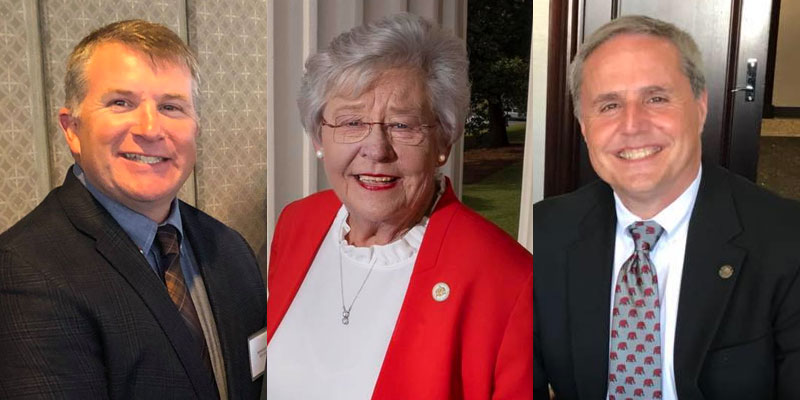In a letter sent to Governor Kay Ivey on Monday, State Reps. Danny Garrett (R-Trussville) and Joe Lovvorn (R-Auburn) called into question the implementation of recent State Health Orders related to the coronavirus (COVID-19) pandemic.
Yellowhammer News on Tuesday obtained the letter, which began by saying, “At the request of Speaker Mac McCutcheon, we have been asked to regularly update and inform the leadership of the House of Representatives about concerns and recommendations from the Alabama business community as we all work through the Cornonavirus crisis.”
“We are also members of the Emergency Small Business Task Force you established to address concerns specific to the small businesses,” the representatives noted.
While advising Ivey that task force members “support the decisions you and [State Health Officer] Dr. [Scott] Harris have made to make to take precautions necessary to prevent the spread of the virus and to safeguard the health of our citizens,” the letter continued to raise some serious concerns.
“Although we support the Administration’s and Department of Health’s orders, we are concerned that the communication and implementation of these orders have created unnecessary angst, hardship and confusion among individuals and businesses across the state,” Garrett and Lovvorn wrote. “We also believe the goal of limiting spread of the virus has been unintentionally compromised.”
The next paragraph, all in bold, emphasized, “In the future, we urge you to involve members of the business and health services communities in discussions of how best to communicate and implement decisions before orders are executed. We also request that you have a meeting with representatives of the business communities to hear their ideas on what can be done now to address unintended consequences that are occurring.”
The letter then listed three examples of purported communication and implementation concerns:
- First, it was not clear in the initial order that “nonessential” businesses could continue to operate online or that they could utilize pick-up and curbside services. It took more than a week for this matter to be clarified and eliminate the confusion. Many individuals and businesses were unnecessarily harmed during this time.
- Second, the initial order restricted visitors to hospitals. After the first order, we are aware of a situation where a hospital did not allow a family member to speak with medical personnel when their elderly mother – who has numerous health issues and limited ability to communicate—was admitted by ambulance to the hospital at 11;00 PM on a Friday. The family was not able to speak with the hospital personnel until 12 hours later, and only after a representative of ADPH intervened and clarified the order.
- Third, the most recent order drastically reduced the number of people who can be inside an essential business. The affected large stores were not given advance notice of the decision and did not have time to adequately prepare for the ensuing chaos. On Friday night and Saturday before 5:00 PM, these stores were packed to capacity with people inside and outside who were confused about the Stay at Home Order and who were not practicing social distancing. In addition, we understand from several big box managers that merely reducing the numbers of customers inside the store based upon square footage is not an adequate solution.
“In each of the above examples, had a team of business and health care services representatives been involved before the orders were issued, a more effective and workable solution could have accompanied each order and provided clarity and less confusion. In addition, we could have potentially offered suggestions for optimal prevention of spreading the virus,” the letter outlined.
“We urge you to, now and in the future, please involve members of the affected businesses and health providers in developing implementation plans for executive orders. The members of the Legislature also stand willing to help and assist with planning and communication,” Garrett and Lovvorn stated.
You can read the full letter here.
Garrett is the House majority whip and has been an outspoken advocate for small businesses throughout the pandemic. He previously voiced his concerns that an Ivey administration State Health Order treated small businesses differently from national, big-box chains selling the same products.
In an interview with Yellowhammer News last week, Ivey responded to this type of concern, which has been expressed publicly by multiple legislators.
“The job that Dr. Harris and I have is to protect our people of our state, not worry about who buys what from where,” Ivey told Yellowhammer News. “We’re trying to protect our people as best we can…”
She added, “[W]e’re just trying to provide access to people to able to get what they need — but maybe not everything that they want from where they’ve been getting it. It’s just a matter of trying to protect people from coming in contact with one another.”
Ivey also stressed that balancing the economic impacts of her decisions is “one of the hardest things” she has to do.
“Economic health is vital to our people, as well as their safety and their health,” she said. “So, it’s a balancing act — both of which are very important. And I’m sure we’re going to make some mistakes along the way, and we’re not going to please everybody all the time. But we’re trying hard to protect both our economy — small businesses and our large businesses — so we can keep our economy robust, and it’ll be there when we’re all ready to go back to work.”
Sean Ross is the editor of Yellowhammer News. You can follow him on Twitter @sean_yhn
Don’t miss out! Subscribe today to have Alabama’s leading headlines delivered to your inbox.
